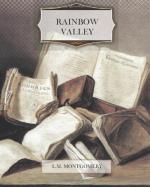After Una cried her heart out she wiped her eyes and went to the spare room. It was dark and rather musty, for the blind had not been drawn up nor the window opened for a long time. Aunt Martha was no fresh-air fiend. But as nobody ever thought of shutting a door in the manse this did not matter so much, save when some unfortunate minister came to stay all night and was compelled to breathe the spare room atmosphere.
There was a closet in the spare room and far back in the closet a gray silk dress was hanging. Una went into the closet and shut the door, went down on her knees and pressed her face against the soft silken folds. It had been her mother’s wedding-dress. It was still full of a sweet, faint, haunting perfume, like lingering love. Una always felt very close to her mother there—as if she were kneeling at her feet with head in her lap. She went there once in a long while when life was TOO hard.
“Mother,” she whispered to the gray silk gown, “I will never forget you, mother, and I’ll ALWAYS love you best. But I have to do it, mother, because father is so very unhappy. I know you wouldn’t want him to be unhappy. And I will be very good to her, mother, and try to love her, even if she is like Mary Vance said stepmothers always were.”
Una carried some fine, spiritual strength away from her secret shrine. She slept peacefully that night with the tear stains still glistening on her sweet, serious, little face.
The next afternoon she put on her best dress and hat. They were shabby enough. Every other little girl in the Glen had new clothes that summer except Faith and Una. Mary Vance had a lovely dress of white embroidered lawn, with scarlet silk sash and shoulder bows. But to-day Una did not mind her shabbiness. She only wanted to be very neat. She washed her face carefully. She brushed her black hair until it was as smooth as satin. She tied her shoelaces carefully, having first sewed up two runs in her one pair of good stockings. She would have liked to black her shoes, but she could not find any blacking. Finally, she slipped away from the manse, down through Rainbow Valley, up through the whispering woods, and out to the road that ran past the house on the hill. It was quite a long walk and Una was tired and warm when she got there.
She saw Rosemary West sitting under a tree in the garden and stole past the dahlia beds to her. Rosemary had a book in her lap, but she was gazing afar across the harbour and her thoughts were sorrowful enough. Life had not been pleasant lately in the house on the hill. Ellen had not sulked—Ellen had been a brick. But things can be felt that are never said and at times the silence between the two women was intolerably eloquent. All the many familiar things that had once made life sweet had a flavour of bitterness now. Norman Douglas made periodical irruptions also, bullying and coaxing Ellen by turns. It would end, Rosemary believed, by his dragging Ellen off with him some day, and Rosemary felt that she would be almost glad when it happened. Existence would be horribly lonely then, but it would be no longer charged with dynamite.




